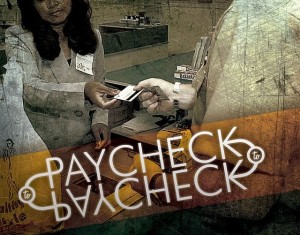 We normally talk about how you can save money by doing things yourself around the house. However we felt that this topic was so important that we wanted to post it here on this web site. If you can get your monthly budget under control and develop some savings, you will be at far less risk of losing your home. Living pay cheque to pay cheque can also be very stressful. Saving money around the home will make it much easier to survive a job loss. Read on and let us know if you have comments that would assist our readers. This is your emergency fund that you can rely on when a financial emergency occurs.
We normally talk about how you can save money by doing things yourself around the house. However we felt that this topic was so important that we wanted to post it here on this web site. If you can get your monthly budget under control and develop some savings, you will be at far less risk of losing your home. Living pay cheque to pay cheque can also be very stressful. Saving money around the home will make it much easier to survive a job loss. Read on and let us know if you have comments that would assist our readers. This is your emergency fund that you can rely on when a financial emergency occurs.
Living Pay Cheque to Pay Cheque
The following survey is a sad picture of Canadian savings habits. It also high lights the exposure that over 60% of Canadians have to losing their homes, cars and more if they were to lose their jobs. The blunt advice that these people need to follow is :
- Save 10% of your paycheck every month
- Have 3 months salary in savings available if you should lose your job
- Get your budget under control and learn to live with less money so you can prepare for the future.
Survey Results
The results of the survey follow and it is a sobering message for many Canadians. Almost 60 per cent of Canadians live pay cheque to pay cheque and say they’d be in financial difficulty if their pay cheque were a week late.
A new survey from the Canadian Payroll Association released Monday showed some troubling signs about Canadians’ personal finances.
The 59 per cent figure is the same rate as the one found in last year’s survey. It is the second year that the agency has undertaken the payroll survey.
Almost half of respondents to a national survey said they are saving five per cent or less of their income. Financial planning experts generally recommend a retirement savings rate of about 10 per cent of net pay. They should also hoard three months’ worth of expenses in an emergency fund.
Although they don’t appear to be having much success doing so, 60 per cent of respondents said they were trying to save more money than they used to. The remaining 40 per cent said they were not trying to save any money.
Impact on Retirement
“The most significant result of Canadians continuing to live pay cheque to pay cheque is its impact on their personal finances and retirement,” CPA chair Cindy Forget said.
Younger workers feel especially vulnerable. 65 per cent of respondents aged 18 to 35 saying they would find it difficult to make ends meet if they missed a single pay cheque.
More than two thirds (69 per cent) of respondents said it would be difficult to find comparable employment with a similar salary if they lost their job.
For the survey, the agency interviewed 2,766 Canadian employees across the country. The survey is considered to be accurate within 1.86 per cent, 19 times out of 20.
It was taken between June of 2009 and July of 2010.
“End of Survey”
Living Pay Cheque to Pay Cheque – Summary
In case US citizens are reading this and feel that they may be better off than Canadians, think again. You have just gone through and are beginning to come out of a major recession which Canada pretty much avoided. You need to adopt these savings approach even more than Canadians, since jobs are more difficult to come by in the US than they are in Canada. If the past 4 years was bad enough, hopefully we all have learned that having some free cash available when you have an emergency can make a huge difference in your life.
In some cases having that emergency savings can mean the difference between putting food on the table or not. If you live pay check to pay check, and your pay check stops for some reason, there is no money to pay the bills or even buy groceries. Start saving now!
For more cost saving ideas, click here.
July 4th, 2012 on 2:30 pm
this is a tough way to live. The only way we know of to get out of this situation is to get another job and also set aside 10% of your gross as savings for a future retirement and emergency situations.